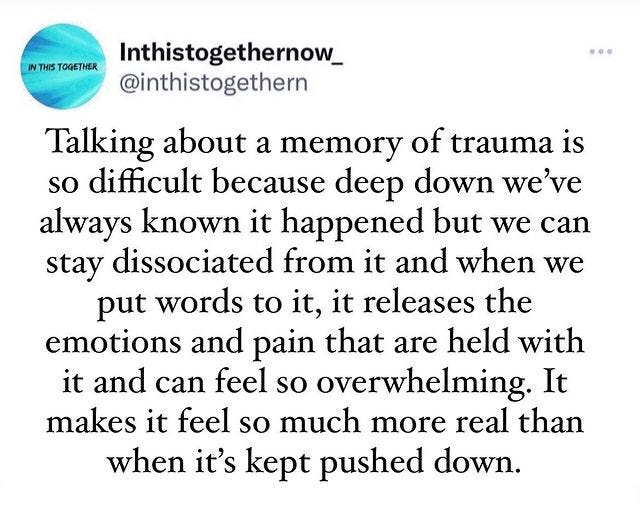Child Abuse and Mental Health Survivors Information - Issue #108
Talking about it is hard. Do it anyway.
Thank you for reading the Child Abuse and Mental Health Survivors newsletter. Each week I share new blog posts and other resources that aim to help survivors of childhood abuse and those who are struggling with mental health issues feel less alone as we discuss the issues surrounding our issues. If you’ve tried to follow the resources I share on social media and find that the algorithm has decided for you to not show you the things we post, this is the best way to get caught up each week.
For more information about me and why this newsletter exists visit the website - Child Abuse Survivor.

These two Instagram posts showed up on the same day:
It’s important for all of us to remember how hard it can be to talk about our trauma experiences. I have gotten relatively comfortable talking about my childhood abuse, but it’s still emotional labor. It can be down right exhausting, and I remember well hearing others, like Aly Raisman, share their own self-care routines that help get rested and ready after the emotional work that getting up in front of an audience and telling your story can be.
But you don’t even have to be telling it to an audience of hundreds. Just talking about it to one person is labor. But you do it, because your voice deserves to be heard, and it especially needs to be heard by the survivors who haven’t found theirs yet.
How else will they know they aren’t alone if we don’t share with them?
So, practice good self-care, give yourself grace for speaking with a shaky voice, or through tears, and find your own voice. The world needs it.
We need more survivor voices to drown out all the noise out there. And if you haven’t found your voice, or you don’t feel like you have a trauma story to tell, share the voices you do hear with those around you who need to hear them. Be an amplifier.
Make sure folks know where to find those voices.
New from the Blogs
We all have the ability to create these moments of connection. Unfortunately, too many of us choose not to. That is to our own detriment as well as the other people we could impact.
Men Have No One to Truly Open Up To According to Men
It's rare to have someone you trust enough, and are comfortable enough with, to share yourself completely. As I've said before, we simply don't prioritize that in our lives. Thus, we don't have it. Despite all the damage that does to us.
Why Advocates Should Think Twice About Laws They Support
Law enforcement officials don't just want to be able to scan for CSAM. That's the excuse to get the public to buy into mass surveillance. "It's for the kids" is disingenuous. It's not for the kids to them, it's to open the door to the police, and anyone with some skill, to watch ALL of our communication and use it in any way they see fit.
I want to support survivors and those dealing with mental health issues by providing safe spaces for them to talk and get support. These laws do the opposite.
Shared from Elsewhere
This was a good conversation, and an important reminder - Trauma Recovery is not One Size Fits All
Listening, really listening, is a thing:
Also -
A form of abuse we don’t talk about as often, but should - Healing From Emotional Abuse
The NFL and 988 partnering up - Suicide Prevention Video Series
Q&A: The impact of childhood bullying on adult mental health
From the Archives
What We Really Need is Compassion
Helping others, is self-care. It provides us that feeling of doing something that we all need, along with connecting us to others, which is also something we all need more of.
So, yes, take some time for your own needs, but just as importantly, how can you act compassionately towards the other people in your life?
What is the Justice System For, Anyway?
But, not winning in court does not really have anything to do with what happens next with survivors. They are still here, and still capable of healing. What if we could find a way to provide that help? What would that look like, and what would that take?
What Does it Mean to Hold Space For Someone?
For me, I’ve always viewed holding space in terms of that word, safe. When I hold space for someone I’m not solving their problem, or questioning them. I’m simply letting them be. Whatever that might look like at that moment, and I’m making sure that they are safe. It means making sure that being in my presence, either in person or virtually, is a place where they are free to cry, vent, question, or whatever form of expression is needed to help at that moment. It means being the person who is simply there, listening, offering support, but above all else, keeping them safe, physically, emotionally, mentally, etc.
Thanks for reading. If you find this newsletter informative and helpful to you, spread the word. That’s the best way you can say thank you for the effort I put in each week.



